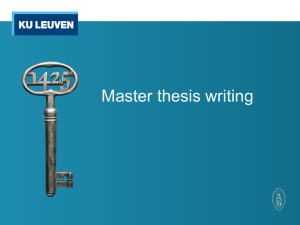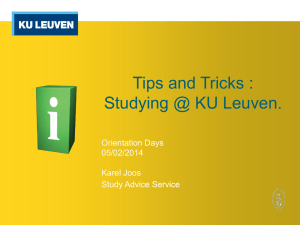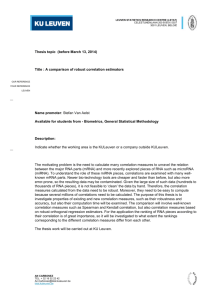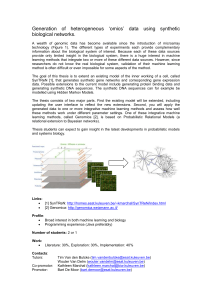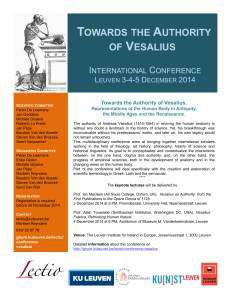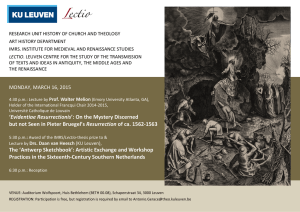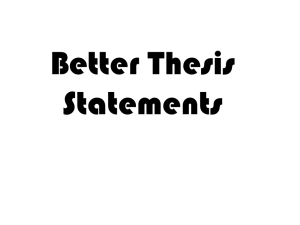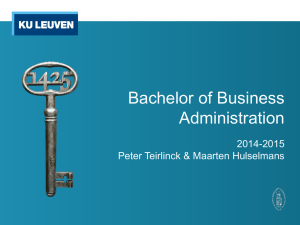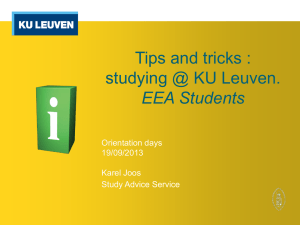tips and tricks 4 master thesis
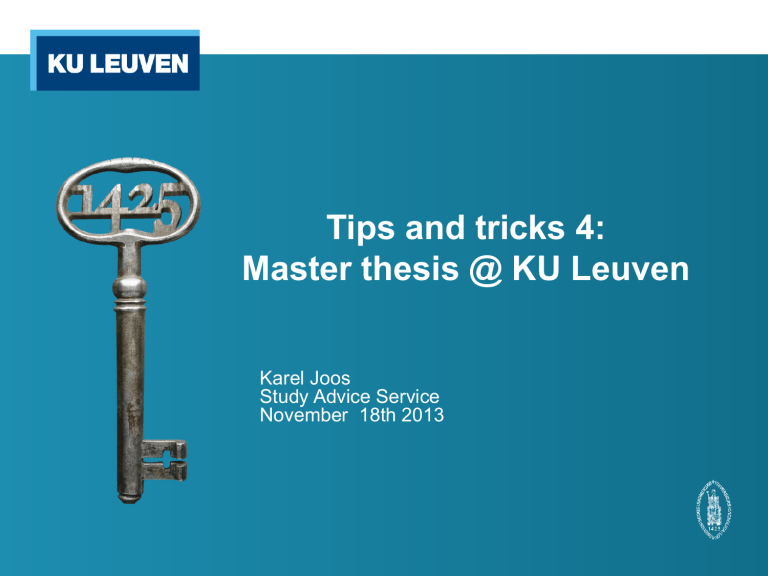
Tips and tricks 4:
Master thesis @ KU Leuven
Karel Joos
Study Advice Service
November 18th 2013
introduction
•
General approach o Not : Regulations in faculty o o
Reduction in 1 hour?
Focus on : how to organise thesis work o o
Focus on 1 year master
This session : sometimes to general
Overview of session
•
Goal
•
Long term planning
• choice of topic
• brainstorm
• library research
• temporary table of content (!)
•
(labo) research
• analysis of results
• writing
• rewriting
• finishing touch
•
Role of promotor
Goal of master thesis
• proof you can o summarize large amount of information, o o o conduct scientific research, write in academic style independent working (limited coaching of promotor)
• not : o world shocking new scientific discoveries o super intelligent insights
Long term planning
•
Okt-Nov : o o o choice of topic brainstorm library research o temporary table of content : word document that is growing
•
Dec : o writing first draft chapter 1 : literature
•
Jan - Feb : o o
(labo) research o (statistical) analysis of results
•
March - April: writing : o
•
Mai : rewriting literature part o o rewriting finishing touch
Choice of topic
•
Facultary organisation
•
How to decide?
•
Information about other facultary rules o How many pages o Criteria o o
Regulations about style :
• academic reporting
• quotes and references
• tables
• formal aspects (front page, …)
• …
Deadlines
Brainstorm
•
About : o o o o
Where to look for information?
• Relevant aspects (broader scope)
• Library (search engines)
• Other thesis, phd research
• ….
How to conduct your research?
Hypotheses
…
Library research
•
Takes time
•
Copy and mark o Avoid reading everything twice o Elements of reference list
• author(s)
• name of book, journal
• year of publication
• publisher
• ? quoting from website ?
Library research
•
Composing references : o
‘Reference manager’ o
‘End note’
•
Library : search engines o o http://bib.kuleuven.be/english/ub/searching
Limo, Eric, Web of Science, …
Temporary table of content
•
Heart of the matter!
•
Difficulty : o Large amount of information
• ?trying to have the whole content of your thesis in mind? o o
Unstructured
Uncertain (results?)
•
The very problem for most students in individual coaching!!!
Temporary table of content
• preface
• table of content
• introduction
•
Chptr 1 : overview of literature
•
Chptr 2 : research plan o hypotheses, methodology, …
•
Chptr 3 : research o implementation, results,…
•
Chptr 4 : conclusions and suggestions for further research o Comparison : hypotheses - results
• list of tabels, figures
• bibliography
– reference list
• annexes
Temporary table of content
•
From chaos to structure????
•
Initial data :
?
Temporary table of content
•
How to structure unstructered info: o there’s no structure that perfectly fits the data o structure = tool to communicate with the reader
•
Decide yourself what structure should be o
Example 1 : “house” : structure according to :
• different rooms
• different looks from the outside
• different phases in which it was built (first basement,…)
• different sorts of material used o Example 2 : thesis
Temporary table of content
•
Word document o With key words on different levels o Easy to change structure o Write down everything you think of
• Concepts, formulas, remarks, quotes, theories, articles,…
• Suggestions
• Things to do??
•
= One overview (working paper) o Later on : start from this document to write the same in full sentences
Temporary table of content
•
Exercice : o
Try to structure the ‘streets of Leuven’
Temporary table of content
•
Structure = communication with reader o Who is reader (to focus on)
• Not professor
• Interested, intelligent human being with not to much knowledge about your topic o
Difficulty : “this is too obvious to write”
•
Always an exception on structure o Houserooms : what with a ‘terrace’ or car port, is it a room or not?
• This will be the “remarks”
Research
•
Labo, interview, experiments,
•
Takes lots of time
•
Prepare in advance o Appointments for an interview : 3 weeks before?
(Statistical) analysis
•
Confrontation with quality of data o Risk to postpone confrontation
• Also a ‘negative’ result is a result.
Writing
•
Final tabel of content o Will be read by almost anyone o Text itself will not always be read from a to z
•
Text o o
Starting from temporary table of content
1 page per day
Writing
•
Comprehensible o Tell story to someone
•
Academic o o
Objective :
• verifyible facts
• verifyible sources
Clear difference between personal opinion and facts
Writing
•
Meta language : o o
Language about the language
Say what you’re going to say
• “to summarize”
• “on the contrary”
• “I will focus on ….” o Explicitation of links
• from paragraph to paragraph
• “the same result was found in…”
• “on a more general level, the results of …”
• from part to part
Writing
•
Quotes and references o Lots of discussion within K.U.Leuven(!) o o o o
Within text + in reference list
Facultary regulations
Plagiarism :
• http://www.kuleuven.be/plagiarism/
What in case of :
• Paraphrasing
• Summarizing only the idea of an author
• Common sense
Rewriting
Finishing touch
What to expect from promotor
•
Differences between promotors
•
Promotor : o Initial indication o Suggestions on content, research o Reading text o +/- 4 appointments
•
Expects you to work independently
Contact
o Study Advice Service
Naamsestraat 80
3000 Leuven
016/32 43 11 www.kuleuven.be/studyadvice o Karel.Joos@dsv.kuleuven.be
